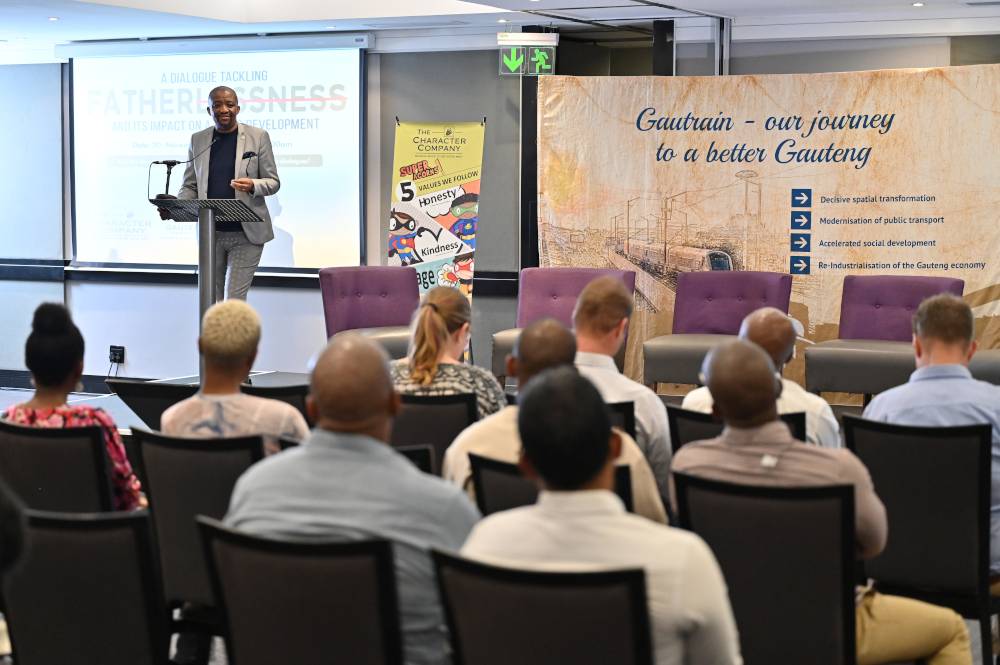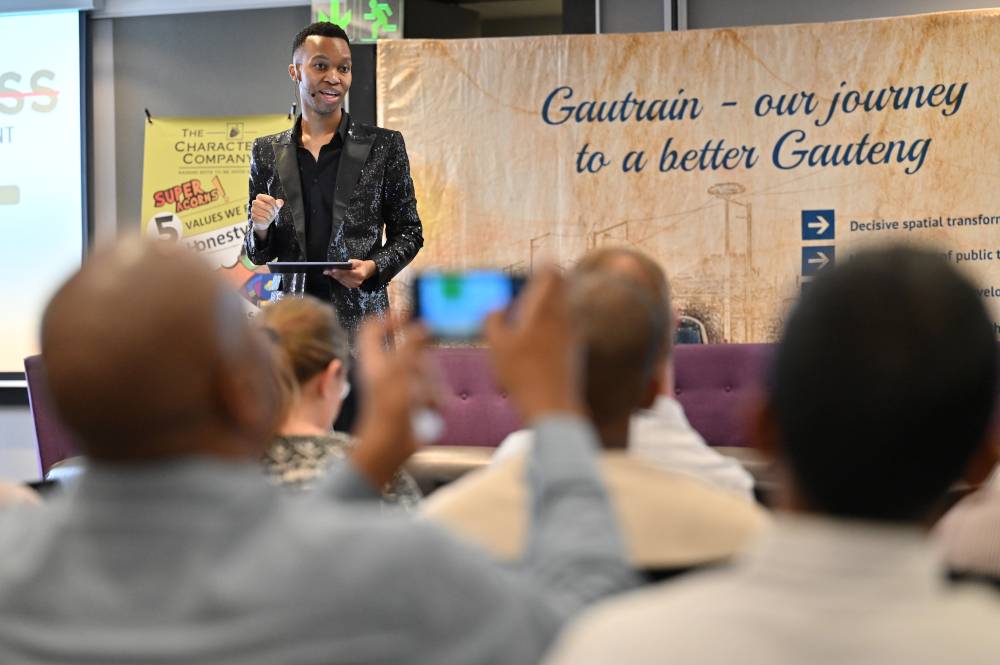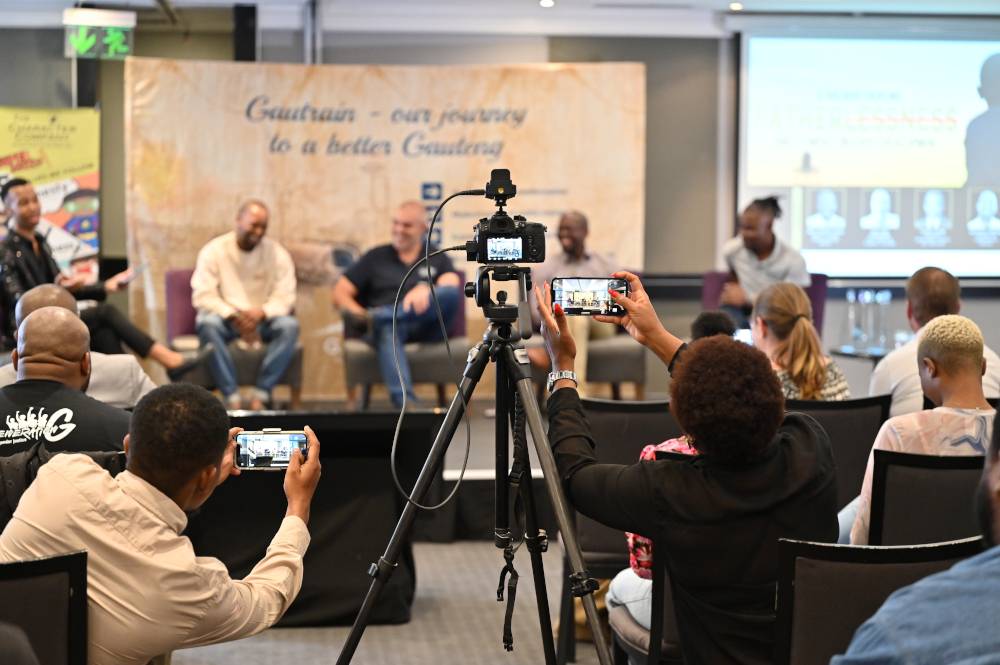Kgaugelo Habyane, podcaster behind Manned Up Conversations, Jaco van Schalkwyk, Founder of the Character Company and Professor Malose Langa at the #Fatherlessness Dialogue.
Gautrain partnership aims to ‘raise boys to be good men’
The absence of fathers is a crisis facing South African society. By some estimates, up to 80% of the country’s boys grow up without a father or father figure. This lack of positive male guidance and role models has detrimental effects on young boys’ development and outcomes later in life. This is the grim reality behind A Dialogue Tackling Fatherlessness and its impact on boys’ development, hosted by the Gautrain Management Agency (GMA) in partnership with the Character Company and the Mail & Guardian earlier this week.
The conversation, however, was not one of doom but one of hope. Gauteng’s high-speed commuter rail brought together experts to spotlight the impact of fatherlessness, but more importantly, showcase an innovative mentorship programme model that aims to change the trajectory of South Africa’s boys, raising them to be good men.
WATCH: The #Fatherlessness Dialogue – Hosted by Gautrain Management Agency
Gautrain CEO Designate Tshepo Kgobe opened the discussion by explaining that the campaign aims to empower men to step into the gap left by absent fathers, and in doing so contribute towards raising the men South Africa needs. “Studies show that as many as four out of five boys are growing up without father figures or positive male role models, and this underscores the devastating impact we witness.”
Acknowledging that its responsibility extends beyond transport, the Gautrain’s Wellness of a Child campaign, which is now in its second year, continues to address the challenges facing South Africa’s boys. This is done through programmes run in partnership with the Character Company that focus on nurturing their development and introducing them to mentors who model positive masculinity.
Kgobe likened this to “kintsugi”, the Japanese practice of repairing broken pottery with gold, which celebrates the object’s journey rather than its perfection. “Within the brokenness of society and the damage, the Character Company is the golden glue that not only repairs the damage but shows us how to embrace and celebrate the imperfections,” he explained. “From this brokenness, we can create something new … something better.”
 Chief Executive Officer Designate of the Gautrain Management Agency, Tshepo Kgobe, on the podium.
Chief Executive Officer Designate of the Gautrain Management Agency, Tshepo Kgobe, on the podium.
He said every boy deserves the opportunity to grow into his potential, and in doing so impact the world around him in a positive way: “It doesn’t matter where somebody came from; what matters is how we help them get to the next level. It does not matter where we have been. It matters that we are all here today to address these challenges together, because we know that there exists a space for young men to grow; a space where we can create a better South Africa.”
The campaign’s focus on the boy child does not negate the challenges faced by girls. “The scourge of gender-based violence exists because boys and men lack a guiding light; someone to look up to who can show them the way,” he explained.
He says the Wellness of a Child campaign is about bringing people — men and boys in particular — together to show them a different way of living. “It’s about creating a world where mentoring is valued and where we can openly discuss the challenges and solutions; a world where young men know that change is possible.”
Let’s talk about masculinity
The event centred around a frank panel discussion, moderated by broadcaster and media personality Siya Sangweni. He was joined in conversation with Professor Malose Langa on the State of South Africa’s Fathers report, as well as Kgaugelo Habyane from the Manned Up Conversations Podcast. Joining them was founder of Character Company Jaco van Schalkwyk, and Kingsley Tloubatla, one of the organisation’s MENtors.
Langa set the scene with a reminder that the current state of fatherlessness in South Africa cannot be explored without acknowledging the country’s complex historical context, with particular emphasis on apartheid and its migrant labour systems. “Families were disintegrated and fathers were nowhere to be found.”
He said there has been a shift in recent years from emphasising the need for fathers to provide financially for their families to them also making an emotional contribution to their children’s lives. “A lot has shifted, but a lot still needs to be done,” he added.
Habyane said the Manned Up Conversations podcast was born from a need for a safe platform, to have the difficult discussions needed to shift the narrative:.
“It’s about creating a space where people can speak freely and then reflect on what they’ve said. It’s a process of self-awareness. I believe asking questions creates impactful conversations. The only guidance is to express oneself while being compassionate and empathetic to others’ struggles. We acknowledge that not everyone has it together, and we aim to eliminate the lone ranger mentality from our discussions. Success stories, struggles, inspiration, heartbreak — our conversations cover a spectrum of emotions, creating a diverse and authentic dialogue.”
He said that these types of conversations facilitate change. “Men often lack opportunities to express themselves because as soon as they do so, it’s labelled as toxic. Instead of shutting people down, we need to give them the opportunity to consider a different angle. It’s not about saying they’re completely wrong, but encouraging accountability and fostering understanding.”
Changing the trajectory
Jaco van Schalkwyk, founder and “dad” of the Character Company, said these conversations are also at the heart of their unique mentorship programme that matches boys aged five to 10 years old with adult male volunteer mentors. The critical age range is targeted due to research showing a father’s influence peaks during this developmental stage for young boys.
Van Schalkwyk’s passion for “MENtorship” stemmed from his own experiences growing up. “As a young boy growing up without a father, one of the most profound challenges is the gap,” he explained, putting his hand to his chest. “This might not be apparent until much later in life, and by the time this becomes visible around the age of 16 or 17 a mindset has already been firmly set and walls have already been constructed, and it becomes difficult to open up to mentorship.”
He said this gap in his own life impacted him significantly, especially when it comes to identity. “It is crucial when it comes to understanding who I am and realising my own value; walking around with this sense of lesser value also makes one vulnerable to abuse and bullying.”
It’s not that mothers aren’t good enough. “The truth is they, they just aren’t ‘dad’ enough,” Van Schalkwyk added.
He said the transformative power of mentorship is at the core of the conversation: “If we neglect this aspect then we risk losing the positive message; the conversation about hope. It’s crucial to focus on the positive outcomes and what happens when individuals are guided through challenges successfully.”
The Character Company aims to create a culture of leadership, replacing the existing culture that perpetuates the challenges that boys, girls, men and women face. By fostering consistent and active mentorship relationships with boys who lack father figures, the programme aims to impart critical guidance during boys’ formative years of building their identity and value systems.
A collective responsibility
When asked about the role that women and mothers have to play, van Schalkwyk said: “It is essential to take a breath and focus on tangible results. What is incredible about this dialogue we’re engaged in is that it provides a platform for everyone to have a voice. It’s not solely the responsibility of the Character Company to tackle these issues, and we don’t operate on the assumption that just because we’re doing the work we have all the answers.
“Mothers and fathers, women and men, each and every one of us can make a difference if we work together.”
But for that vision to materialise requires more men to answer the joint call issued by the Gautrain and the Character Company: men need to step up and step into the gap left by others. It is only through ordinary South African men giving back consistent time and guidance that the ripple effects of fatherlessness can be overcome.
According to MENtor Kingsley Tloubatla: “It begins and ends with all of us being the change that we need in society.”
MENtors to lead the way
South Africa faces immense challenges when it comes to fatherlessness and its impact on the country’s boys, but there are phenomenal strides being made to ensure that they have strong male role models. This was according to Professor Malose Langa, an associate professor and senior lecturer in the School of Community and Human Development at Wits University. “There is still a lot to do, but a lot has been done; we need to see these positive stories mentioned in the conversation as well.”
 Broadcaster Siya Sangweni moderated the #Fatherlessness Dialogue.
Broadcaster Siya Sangweni moderated the #Fatherlessness Dialogue.
This is exactly what the Character Company aims to do — share positive stories about manhood and masculinity while providing mentorship and guidance to young boys without father figures. “It’s disheartening to see the issues out there and feel powerless,” acknowledged Jaco van Schalkwyk, the founder of the Character Company. “Our approach involves bringing men in the community together, emphasising their role in the development of boys. We recognise that they may not be fathers, but they hold immense value.”
Early interventions key
Between the ages of five and 10, he explains, is a critical period of development in a young boy’s life; one that sees a young boy transition from the nurturing environment provided by his mother to the adventurous exploration traditionally guided by his father that defines boyhood.
Van Schalkwyk said this period is foundational: “It shapes much of who we are. Moms play a crucial role in accepting and loving their children, but there’s a shift in influence during these formative years. We recognise the importance of fathers — or father figures — stepping into this role during this pivotal time. It is at this age that a boy’s identity, character, discipline structures and value system are laid down. It’s the start of the roadmap that will guide him towards the man he wants to become.”
There is also value in starting early before mindsets have been set, bad habits have taken hold and walls have come up. “By starting early, we can prevent the damage instead of having to try to undo it,” he explains. “We aim to change the narrative, creating a culture where teenagers engage in conversations around vulnerability.”
This is achieved through modelling positive behaviour and fostering discussions. “Influencing their perspective is a gradual process of transformation that starts with the foundational years and extends into adolescence, shaping individuals who challenge the norm,” he said.
Who am I? How can I find my place in this world?
Kingsley Tloubatla is one of the MENtors at the Character Company. He grew up in Soweto, one of five children and the only boy in the family. His father was not around: “I always observed my mom and sisters relating to each other, I saw them talking and receiving guidance about life. It raised questions for me. The persistent question was, ‘Who am I, and how can I find my place in this world?’ ”
This question came with many challenges, but his life changed after a chance encounter with the Character Company. “It resonated with my soul and I immediately felt that this was what I had been looking for and what the world needs,” he recalled. “The journey has been beautiful. I feel like I’m in the right place at the right time. The past few years with the Character Company have been defining in many aspects of my life.”
Tloubatla said his role as a MENtor is to provide a solid foundation for the boys he interacts with in the programme, to equip them with the values essential for daily life. “We break down stereotypes, challenging notions like ‘men don’t cry’ or ‘men shouldn’t express vulnerability’. These conversations encourage the boys to be authentic at a young age and move away from traditional male stereotypes. We avoid those ‘typical’ male conversations around success, money and women, shifting towards discussions on the real challenges men face.”
MENtors to lead the way
Most importantly, he says, every interaction must emphasise the key qualities that the Character Company seeks in its mentors. What are these qualities? “We need FAT men — faithful, available and teachable,” Tloubatla said.
What does this look like? “Faithful in the sense of being consistent and committed to the programme. Available means showing up even when it’s challenging. Emphasising availability is crucial. When the boys know their mentor shows up consistently, it changes the narrative. They feel secure and reassured, even in challenging situations like bullying at school. It gives them a sense of someone intentionally making time for them.”
“Teachable”, he explained, involves being open to learning from other mentors and even the boys themselves. “In my eight years of mentorship, I’ve learned patience, a quality I didn’t expect to solidify with a five-year-old, but it’s been part of the journey.”
‘I can do more than I believe’
Almost a decade ago, Brighton Mugomba was a scared ten-year-old facing a literal wall. He had just joined the Character Company as a mentee and looked forward to their weekly activities. It was during one of these outings — an indoor rock climbing excursion with his new mentor, Jaco van Schalkwyk — that he was forced to admit the truth. He was terrified of heights.
 Guests at the #Fatherlessness Dialogue capture the moment. (All photos supplied by: Gautrain Management Agency)
Guests at the #Fatherlessness Dialogue capture the moment. (All photos supplied by: Gautrain Management Agency)
“The first time I went I could not get halfway up the wall without coming back down,” Mugomba, who is now 19 years old, recalled. “My friends were all excited about the activity and asked how it was, but I did not know how to tell them that I couldn’t do it.”
He said his mentor was understanding but firm: “Jaco is the type of guy who pushes you to finish the things that you start, and I knew this wouldn’t end until I had gone all the way up. And let me tell you, that feeling when I finally made it up and down that wall … I cannot describe it.”
Mugomba, who lost his father when he was just four years old, smiled when he glanced over at his mentor: “It was at the top of that wall that I first realised I can do more than I could ever believe, and I can push past things that I did not think I could. That’s what fathers do. They push you when you want to give up and show you that you can take another step, even if you don’t think you can. It has been a wonderful journey.”
This sentiment was echoed by another beneficiary of the Character Company’s mentorship, 18-year-old Blessing Masia, who lost his father to cancer when he was five years old. He said his experience with the programme has been life-changing. “The greatest benefit has been talking and learning about myself,” he told the audience.
He said that the Character Company has also taught him how to connect with others. “When you don’t talk about your feelings to others, then you keep everything inside, and this can build up,” he noted. “Talking to my mentors has also taught me how to talk to others and how to approach them.”
Despite the pressures of life and social media, he remains steadfast on who he is: “People post about girls and drugs, and I can look at everything, but I know this is not what I need right now. This is not what I want for myself. I want to be a good man, and I want to lead. I want to lead my family and teach my own children one day how to live better and improve the community.”
He said his actions have already had a positive impact: “I have a little brother and I see that more and more, what I do also affects him. If I go out drinking and partying every night, then he is going to do the same thing because he looks up to me. If I learn good values from the Character Company and I live by these values, then it teaches him to do the same thing.”
For more information on how to help raise the men South Africa needs, visit: www.thecharactercompany.co.za